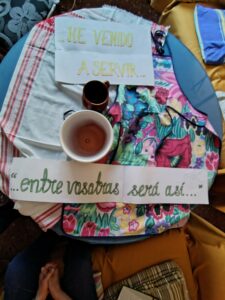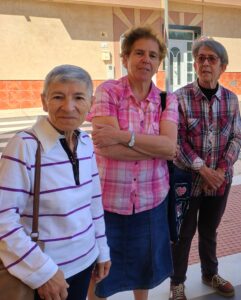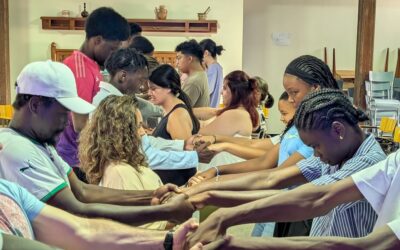Between February and April 2025, Sisters María José Meira (Dedé) and Fatima Borges travel on behalf of the General Team to a part of the Province of Europe.
Below we share the sixth and last chronicle of their trip, from April 21-25, when they visited the communities of Ceuta, Vicar and the General House in Rome. To conclude their visit to the Province, they held an online meeting with the communities of Italy and Albania on June 2.
Ceuta
In this Spanish city located in Moroccan territory there is a community of two sisters, who are dedicated to coordinating, together with other people, the Elín Association. This is a humanitarian organization that since 1999 has been dedicated to defending the human rights of migrants in this border city.
We visited the community house and the Elín Association. We were impressed by the barbed wire walls built by the governments of Morocco and Spain to prevent the passage of Africans to the European continent, and the viewpoint, from where you can see where the boats pass through on their way to mainland Spain.
Vícar
Here the community of three sisters is a simple presence close to the people. They belong to the parish of Puebla and to the neighborhood association. They participate in the Circles of Silence in Almeria. They are very friendly with the people, who are very simple and mostly Moroccans. They are very involved in the Conference of Religious. The area is very low class and squatters. In the work of the Parish Caritas, coordinated by our sisters, food and other products are collected weekly from a large network of supermarkets, which makes it possible to assist and accompany several families in vulnerable situations.
We visited the house of our sisters; the parish church and the parish Caritas headquarters; the immense “sea of plastics” of the greenhouses that are part of the regional landscape; and one of the “Pueblos Mágicos” of Spain, called Enix.
General House, Rome
In February, we began our visit to the Vedruna Province of Europe with a visit to the two communities in Rome (Giardinetti and Casa Santa Joaquina – already published in the first chronicle); now we close the circle by sharing May 7 and 8 with the General House Community.
The project of this community is to participate in the mission of the General Team, being always at the service of the Congregation through general services and also to welcome the sisters and other people who come to this house. One of the sisters teaches music classes at the monastery of St. Cecilia and directs the Giubilate Deo choir. In addition, another sister participates in the activities of St. Pius V Parish, where our house is located; and three sisters volunteer in the soup kitchens of Centro Astali and Dono di Maria, organizations that accompany people in a situation of migration.
Meeting of the communities of Rome and Albania
On June 2, coinciding with the Feast of the Italian Republic, we met online with the 3 communities of Rome – General House, Prati and Giardinetti – and the community of Albania, bringing together a total of 17 sisters. The sessions were recorded to send to those who could not participate. There were two rich moments of resonance, where the call of the group to strengthen the great calls that the Chapter document Born Again makes to us was strongly felt.
Some particularities:
- In Ceuta, the fences, which are an 8.2-kilometer border fence that separates the Spanish autonomous city of Ceuta from Morocco. These fences, along with those of Melilla, were built to control irregular immigration to Spain and the European Union. And it is even more impressive to meet so many young people, accompanied by the Elin Association, who have crossed them, what they tell of their journeys to get there and the resilience and strength of life they show, to get ahead for themselves and their families.
- In Vícar the “sea of plastic” – a vast expanse of greenhouses – accounts for such a large part of the entire region of Almería. This has made the region one of the main fruit and vegetable producers in Europe, but it has also generated environmental and social problems, due to the impact on the local ecosystem.
The other chronicles of the visit are already available:


















